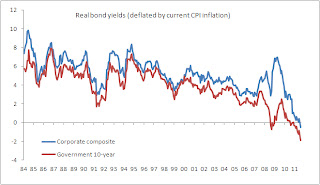How will the euro-area crisis end? Note, Macro Maestro is asking what will happen, not what should happen. Every economist in Europe has a view on the former – expressing those views daily in the financial press – but it’s pretty clear European policymakers aren’t listening.
MM can see several possible outcomes:
1. No countries default and aid/austerity mix is enough (i.e. the current policy)
2. One/several countries default and stay within EMU
3. One/several countries default and leave EMU
4. Core countries get fed up with Greece etc and leave to start new currency.
5. No defaults and full fiscal integration (Eurobond)
The answer certainly isn’t easy, but option 2 seems the most likely.
It is pretty clear austerity alone wont be enough for Greece, particularly with the economy entering a death spiral that will further undermine its public finances. MM has been amazed with Greek efforts so far, but can’t see how these can continue without some kind of social implosion. In this context, eventual default looks certain – indeed markets are already priced for it.
The question then becomes, once default has occurred, will the Greeks stay in the euro area or leave and re-introduce their own currency. From both a Greek perspective and that of the wider euro area, it seems most likely Greece would stick with the euro.
Default would trigger substantial losses for the European banking sector, forcing bank recapitalizations in other euro-area countries. But the destruction could end there – particularly if the Europeans simultaneously announced wider fiscal integration. (Possible because the Germans would be underwriting future not past borrowing, which would come with all kinds of conditions and rules attached.)
If instead Greece left the euro, speculation would grow about other countries abandoning the single currency. This would prompt huge capital flight from other peripheral countries, causing further waves of bank losses. Greek default would turn truly systemic. The same line reasoning also probably excludes option 4 (where the core countries would also face a much stronger currency to further undermine their economic prospects).
It should also be in Greek interests to stay in EMU once it had defaulted. While leaving the euro might seem appealing given the potential depreciation in its new currency, this process would also destroy its banking system. Facing these systemic risks, the Greeks would probably choose to stay in the euro and gradually rebuild the economy’s competitiveness through real adjustment, rather than choose financial suicide.
Markets and indeed most commentators prefer a much simpler solution – the Eurobond (option 5). This is perfectly understandable, but it is clear the European political consensus isn’t there to support it. Indeed, politicians have explicitly excluded this option. That doesn’t mean it’s impossible - the history of macro policy crises shows denial often turns to acceptance when faced with sufficient market pressure – but right now there seems to be too many obstacles and not enough time for such an outcome.



